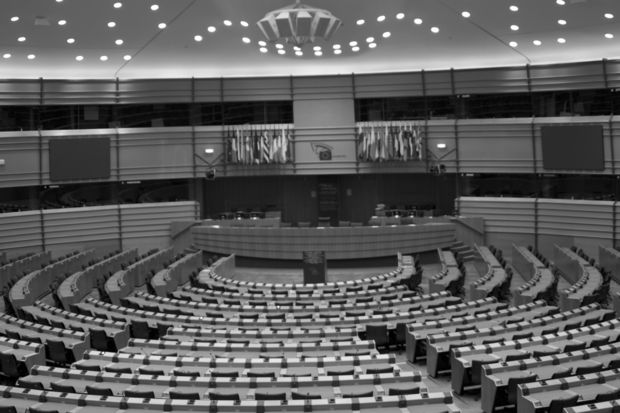The Institute of Politics and Social Policy offers an opportunity to visit EU institutions and learn more about them in-depth.

Heading to Europe
2019 Study Excursion to Brussels in January
For many years now, the Institute of Politics and Social Policy has offered students a unique excursion to Brussels, giving them an opportunity to learn more about important European Union institutions up close and personal. This year’s excursion was a little different from past trips. Organized by Andrea Martinovic, the Austrian student representative for Social Economics, the trip included students who took the course “Political Institutions in Europe” during the past semester. Both course instructors, Harald Stöger and Hansjörg Seckauer, also accompanied the group.
Day 1: Parliament and Commissions
The program kicked off with a visit to the European Parliament where former JKU faculty member and department head, now European parliament member, Josef Weidenholzer painted a lively portrait of parliamentary events. Weidenholzer is part of a number of committees that recently addressed issues such as human rights reports, data protection regulations, constitutional issues associated with Brexit as well as fundamental rights situations in Hungary and Poland.
The students switched from legislative to executive in the afternoon, meaning the European Commission. Ulrich Trautmann, Senior Expert at the Directorate-General for Trade, spoke about the correlation of European institutions in the political decision-making process as well as the commission’s role and scope, which is not limited to the executive branch but also extends to legislative and judicial control.
Day 2: Austria’s Permanent Representation and Representatives for Austrian Interests
Lydia Korinek spoke to the students about the roles and jobs of Austrian members representing Austria’s interests in the EU. Having permanent representatives in Brussels is a productive way to liaison with the Austrian government as well as with the Council of the European Union. There are approximately 150 Austrian representatives in Brussels, including ministry employees, those involved in social partner organizations from cities, communities and the National Bank. The workload was considerable during the latter half of 2018 as Austria chaired the council.
The presence of permanent representatives for social partner organizations is uniquely Austrian. Employee representatives focus on issues such as trade policies, financial market regulations, privatization, wage and social dumping in connection with policies for the free movement of workers. According to Peter Hilpold (Chamber of Labor) and David Hafner (ÖGB) a European Labor Office would help in policing any misconduct in the future.
Martin Schmid, Chamber of Economics, spoke about his concerns negotiating a common position between the individual associations in the Austrian economy and then representing them in a legislative process vis-à-vis the commission and parliament as part of the European umbrella organization Eurochambres. On the other hand, it also works internally by informing members about current developments in Brussels and passing on signals to the commission in Vienna. In addition, legal information is provided to individual companies affected by specific EU rules. Social partners exchange views on a regular basis.
Historical Perspective: Parlamentarium and House of European History
Starting on the first day, we learned about history of the EU at parliament during a digital presentation. The House of European History also provided an interesting look back at history. Equipped with tablets, we explored European history from mythical beginnings in antiquity to its development in the modern age to the turmoil of world wards and the resurrection of current prosperity.
The study trip was didactically beneficial, allowing students to learn about different perspectives in Europe up close and personal, providing insight into how EU institutions work and what they do every day. We learned things textbooks cannot teach us as well as what really matters in politics.








